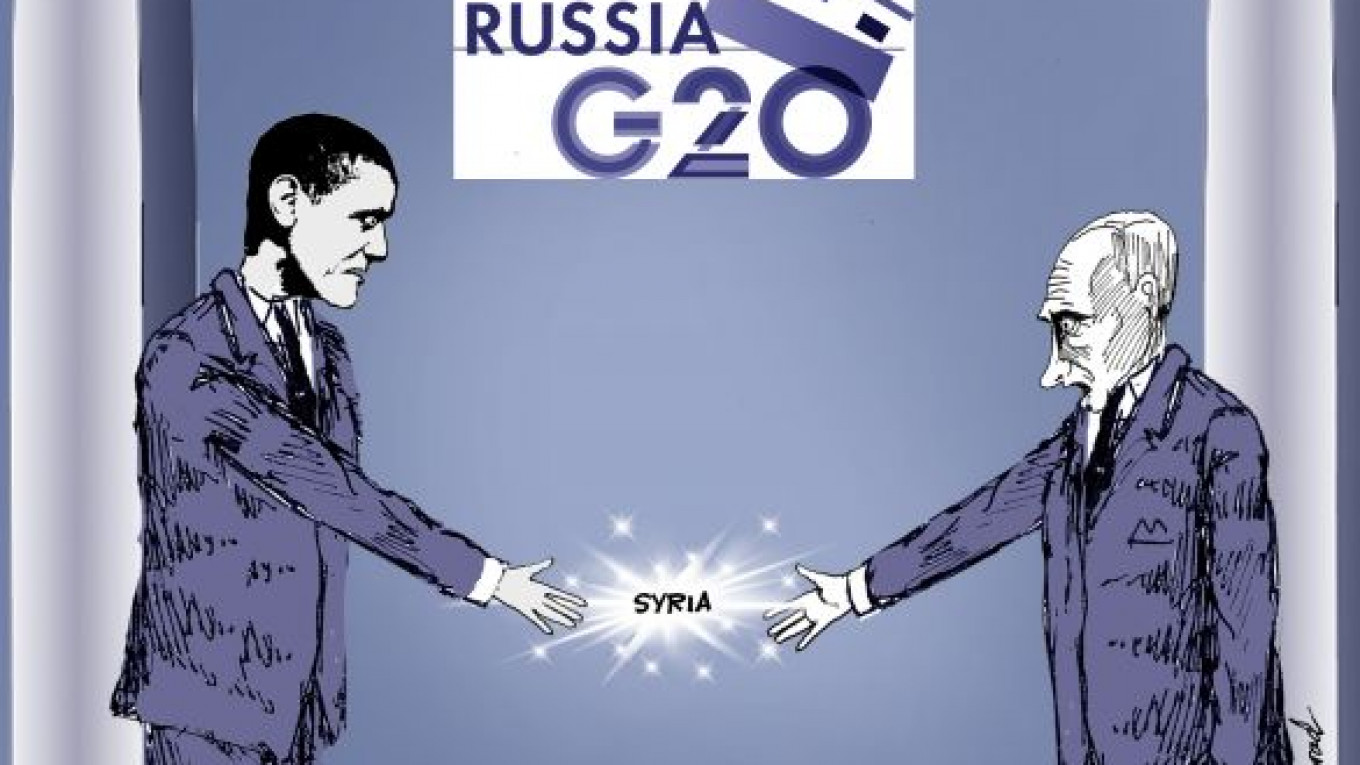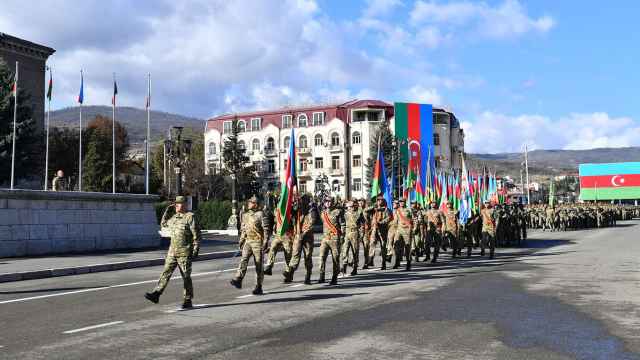The good news is that at the Group of 20 summit last week, U.S. President Barack Obama and President Vladimir Putin found 20 or 30 minutes to speak with each other between sessions. What's more, they smiled for the cameras and avoided exchanging barbs.
It could have been much worse. In an interview shortly before the summit, Putin directly accused U.S. Secretary of State John Kerry of lying in his testimony to Congress by denying the influence of al-Qaida on the Syrian rebels. In fact, Kerry's point, which Putin apparently missed, was that moderate forces among the rebels were gaining in strength — far from being a lie. But Kerry was offended by Putin's remark and did not attend the St. Petersburg summit.
Not only are U.S.-Russian relations at their lowest point since the end of the Cold War, but personal relations between the leaders of both countries have never been worse.
Soon afterward, the Foreign Ministry responded to Washington's legitimate "wanted list" of Russian criminals located outside of Russia whom it wants extradited to the U.S. by issuing a warning to all Russians to avoid traveling to any of the hundred or so countries that have extradition agreements with Washington. The U.S. responded in kind when the Pentagon chief announced that he had information showing that Russia provided components used by the regime of Syrian President Bashar Assad in the production of chemical weapons.
Syria dominated the unofficial agenda of the summit. When asked if Russia would help the Assad regime in the event of a U.S. military intervention in Syria, he answered in the affirmative. Putin did not spell out exactly what form that aid would take, but Russia is already providing Syria with weapons and is prepared to expand economic and humanitarian cooperation as well. For his part, Obama said he did not see this as a potential military conflict pitting the U.S. against Russia. That is somewhat reassuring, but whenever world leaders speak openly about even the hypothetical possibility of a military conflict, relations are pretty bad.
Russia has already deployed several warships to the Mediterranean Sea. But Washington analysts believe that if things get really nasty between the two countries, the only likely attack against the U.S. would be a cyberattack.
The problem is that this situation could escalate rapidly and unpredictably. If the U.S. does strike Syria, just how limited would those actions be? Would war spread to other countries in the region? To what extent would the crisis involve the Middle East as a whole?
What's more, not only are U.S.-Russian relations at their lowest point since the end of the Cold War, but personal relations between the leaders of both countries have never been worse. Without any personal chemistry between Putin and Obama, even the slightest irritation might lead to dangerous consequences. Compare the Obama-Putin relationship with the ties between Soviet leader Leonid Brezhnev and former U.S. President Richard Nixon. At least they had the extremely clever and capable former U.S. Secretary of State Henry Kissinger providing shuttle diplomacy rather than the easily offended Kerry.
To make matters worse, anti-U.S. sentiment has never been exploited by the Kremlin so actively since the height of the Cold War. An atmosphere bordering on hysteria provides both sides with little opportunity to reach thoughtful and constructive decisions. Ultimately, some politicians in Moscow might be thinking "If North Korea or Iran, whose militaries are far inferior to that of the U.S., can get away with their aggressive anti-U.S. rhetoric, why can't Russia — a nuclear power — allow itself to more strongly oppose U.S. policies around the world?"
Nobody seriously believes that a direct military conflict between the U.S. and Russia is imminent, but it does mean that the game of raising the stakes in this confrontation could be more irresponsible than it would have been during the Cold War, when the two countries were ruled by men who knew the reality of war from personal experience.
It seems that even Russian human rights activists feel the increased tension in the air. Some said they were too busy to meet with Obama in St. Petersburg, probably bowing to the overwhelmingly negative public opinion in Russia regarding such contacts. And fueling that hostility, some Russian television channels aired footage of the deputy minister counsellor for political affairs at the U.S. Embassy, Howard Solomon, meeting with human rights activists while implying that they had come to ask for money from the U.S. State Department. Those who did meet with Obama did not limit their discussion to only human rights issues. They also said U.S. military action against Syria would be a huge mistake.
Judging from Putin's behavior at the summit, it seems that he understands that the Western countries supporting the U.S. position on Syria will no longer listen to his arguments and that he will be unable to protect the Assad regime from falling. Now he will probably just sit on the sidelines and watch as the Middle East crisis creates a whole new set of problems for the U.S. But even that so-called neutrality would be essentially hostile. Under the right circumstances, that faсade of neutrality could evaporate completely. For these reasons, it now seems almost inevitable that Russia and the U.S. will become locked in a new Cold War.
Georgy Bovt is a political analyst.
A Message from The Moscow Times:
Dear readers,
We are facing unprecedented challenges. Russia's Prosecutor General's Office has designated The Moscow Times as an "undesirable" organization, criminalizing our work and putting our staff at risk of prosecution. This follows our earlier unjust labeling as a "foreign agent."
These actions are direct attempts to silence independent journalism in Russia. The authorities claim our work "discredits the decisions of the Russian leadership." We see things differently: we strive to provide accurate, unbiased reporting on Russia.
We, the journalists of The Moscow Times, refuse to be silenced. But to continue our work, we need your help.
Your support, no matter how small, makes a world of difference. If you can, please support us monthly starting from just $2. It's quick to set up, and every contribution makes a significant impact.
By supporting The Moscow Times, you're defending open, independent journalism in the face of repression. Thank you for standing with us.
Remind me later.







